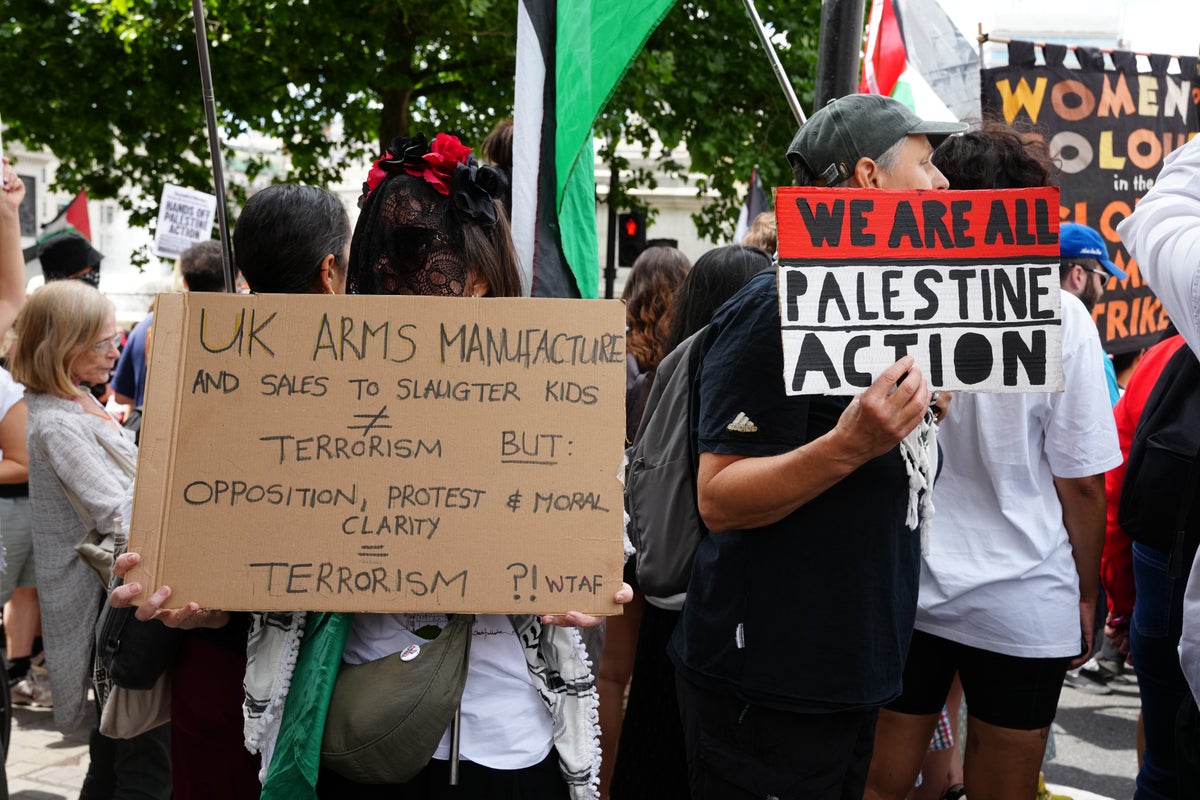
Young people “are going to be committing terrorist acts, probably, by the weekend”, Lord Walney has warned during a debate on the proscription of protest group Palestine Action.
The former independent adviser on political violence and disruption described a “gap in the law”, because the Government cannot proscribe protest groups which are “committing systematic criminality” without using terrorism powers.
He backed the Home Office’s plan to ban Palestine Action, adding it to the list of 81 organisations which are already proscribed including Hamas, al Qaida and National Action.
Lord Walney told peers it was “a nonsense” that groups which have advocated causing “damage”, such as Palestine Action, “have been able to operate freely for as long as they have”.
But opposing the move, Labour former Northern Ireland and Wales secretary Lord Hain warned: “If you start labelling people willy-nilly terrorists right across the board, you’re going down a very, very dangerous route.”
Lord Walney said: “There is a gap in the law, it seems to me at the moment, where we ought to be able to place a restriction on an organisation that is committing systematic criminality in the name of a cause without necessarily branding them as terrorists.”
He suggested a future law change could mean authorities do not “end up branding young people who are going to be committing terrorist acts, probably, by the weekend” as terrorists.
The independent crossbench peer, who was previously a Labour MP, later said: “I think we have to think more in the Labour movement about working people here, because they have been systematically targeted in defence factories. They have been deeply intimidated.
“At times, they have been violently injured, and it’s totally unacceptable for the Labour movement to say, ‘well that’s ok, because it’s in a cause’.”
The Home Office’s order, using the Terrorism Act 2000, will make it a criminal offence punishable by up to 14 years in prison to be a member of Palestine Action or to support it.
The group claimed responsibility for a break in at RAF Brize Norton last month, when activists damaged two RAF Voyager aircraft using paint.
Crossbencher Lord Carlile of Berriew, a former independent reviewer of terrorism legislation, urged peers to “act responsibly” by “accepting this instrument”.
He said: “Every day the police prosecute people for theft. The maximum for theft – I’m not sure if it still is, but it was seven years at one time. Practically nobody gets seven years for theft.
“Most people get a non-custodial sentence. The assumption that everybody who’s prosecuted is going to be locked up for years and years and years is a misleading premise for this debate.”
Lord Hain was one of three Labour rebels who backed a motion to “regret” the Home Office’s plan, which Green peer Baroness Jones of Moulsecoomb moved.
He was joined in the “content” lobby by Lord Hendy and former Trade Union Congress general secretary Baroness O’Grady of Upper Holloway.
“Frankly, I’m deeply ashamed,” Lord Hain told peers.
“This Government is treating Palestine Action as equivalent to Islamic State or al Qaida, which is intellectually bankrupt, politically unprincipled and morally wrong.”
Lord Hain earlier said: “In 1969-70, I was proud to lead a militant campaign of direct action to disrupt all-white, racist South African rugby and cricket tours, and we successfully succeeded in getting them stopped for two decades.
“No doubt, I would have been stigmatised as a terrorist today rather than vilified as I was then.
“That militant action could have been blocked by this motion, as could other anti-Apartheid activity, including militant protests to stop Barclays bank recruiting new students on university campuses, eventually forcing Barclays to withdraw from Apartheid South Africa.”
Home Office minister Lord Hanson of Flint said he had previously protested.
“Freedom of expression, freedom of assembly are cornerstones in our democracy,” he said.
“I have protested. I know of many other members who’ve protested against various things in our lives, and we have done so in a fair and open way.”
He added: “People engaged in lawful protests do not need weapons.
“People engaged in lawful protests do not throw smoke bombs and fire pyrotechnics to innocent members of the public, and people engaged in lawful protest do not cause millions of pounds of damage to national security infrastructure, including submarines and defence equipment for Nato.”
Baroness Jones described a “long and noble tradition of the use of direct action by protest movements”.
She added that “Palestine Action is not like any other group that the British Government has declared a terrorist organisation so far”.
Her motion to regret was rejected by 144 votes to 16, majority 128.
Peers who had stayed in the chamber afterwards called “content” to back the order, which has also received MPs’ backing in the Commons after a vote on Wednesday.
